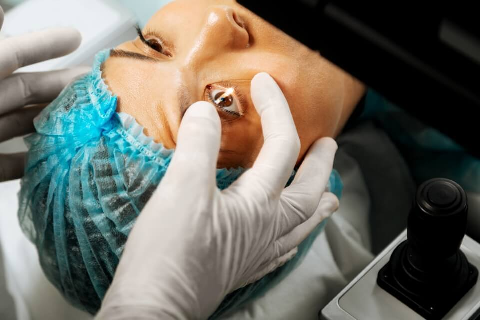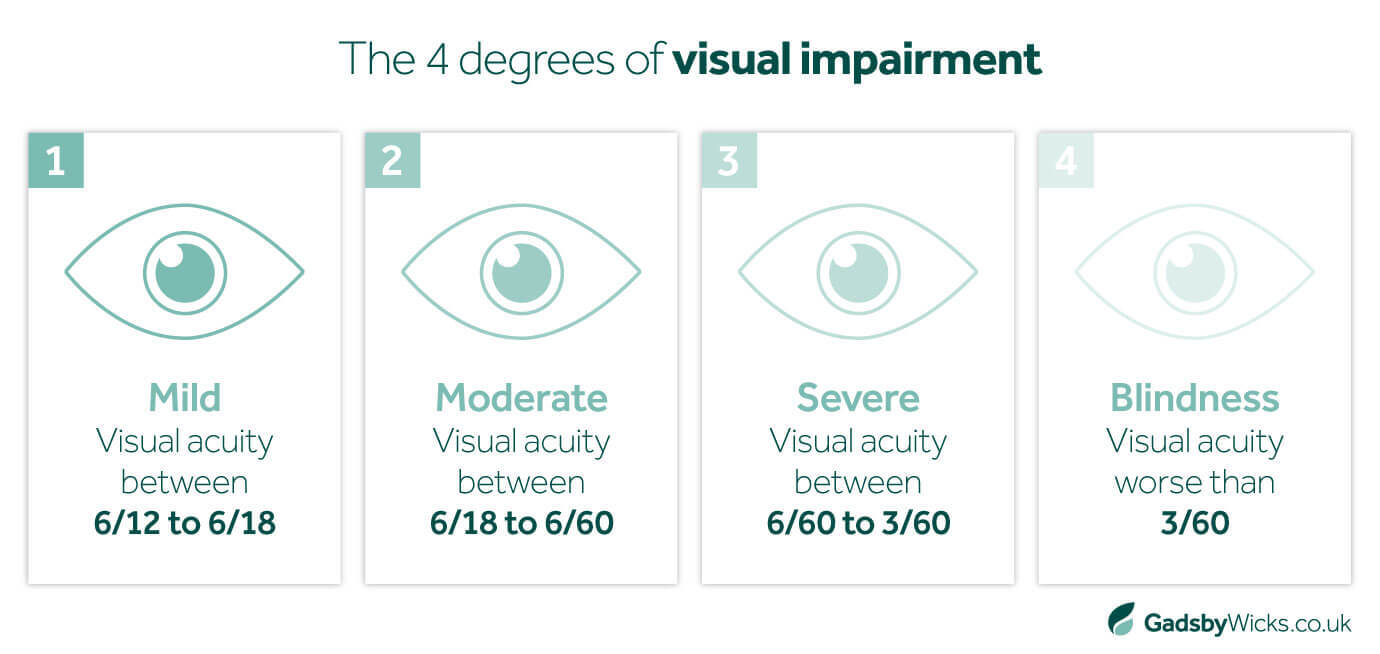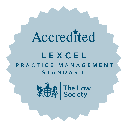- Home >
- Eye Negligence Claims
Our vision guides us through life. If we lose it, the consequences can be traumatic, restricting our independence and turning once-simple tasks into huge obstacles. If you or a family member has been left in this position by a medical error, you have a right to justice.
For over three decades, our eye negligence claims solicitors have led our clients to successful outcomes and recovered millions in compensation. Through our meticulous investigations, relentless tenacity and compassionate support, trust our specialists to secure your financial future and gain much-needed closure.

Do you have an eye negligence claim?
Losing your vision can be one of the most devastating experiences you can endure, especially when it happens suddenly or unexpectedly. While most eye treatments are performed safely, a mistake can turn your life upside down in an instant.
If you or someone you loved was mistreated by an ophthalmologist, optician or eye surgeon, you deserve answers from those who let you down, compensation to protect your family’s future, and justice for what went wrong. Our solicitors work tirelessly to ensure your distress is acknowledged and addressed.

The specialist sight loss claims solicitors for Essex & East Anglia
Since 1993, our highly accredited solicitors have helped hundreds of claimants find answers for what happened and get the justice they deserve.
We understand how life-changing eye injuries can be both professionally and personally. We diligently review all evidence and support you every step of the way, allowing us to resolve 96% of our claims outside of court. Backed by a firm ‘no win, no fee’ approach, we fight your corner to secure a settlement that gives you the best possible quality of life.
What does our eye negligence claim process look like?

A free initial consultation
Call us, request a callback or complete our online form and we’ll assess if you have a valid medical negligence claim.

Funding your claim
Discover the ways we can fund your claim without you paying a penny at any stage of the process.

Investigating evidence
We gather medical records, witness statements and more to learn what happened to you and prove your claim.

Instructing independent medical experts
We work with impartial, experienced medical experts to establish whether your injuries were due to substandard medical care.

Valuing your claim
We assess your health and financial losses to accurately estimate how much compensation your claim is worth.

Presenting your case
We contact the Defendants and the Courts on your behalf to set out your allegations and receive a response.

Negotiating a settlement
We work to achieve a fair settlement for you outside the courtroom – this is how 96% of our cases end.

Preparing for Trial
If we must proceed to Trial, we fully prepare you for what to expect so you receive the right result in court.
FAQs about eye medical negligence claims
How are blindness and loss of sight defined?
The International Classification of Diseases 11 (2018) outlines that there are four degrees of visual impairment:
- Mild – visual acuity worse than 6/12 to 6/18
- Moderate – visual acuity worse than 6/18 to 6/60
- Severe – visual acuity worse than 6/60 to 3/60
- Blindness – visual acuity worse than 3/60
To register as blind or partially sighted on your local social service’s register, an eye specialist (ophthalmologist) must certify the health of your eyes and your eyesight. In the UK, to be considered blind or severely sight impaired, you must fall into one of the following categories:
- Visual acuity of less than 3/60 with a full visual field
- Visual acuity between 3/60 and 6/60 with a severe reduction of field of vision, such as tunnel vision
- Visual acuity of 6/60 or above, but with a very reduced field of vision, especially if a lot of sight is missing in the lower part of the field
Approximately 2 million people in the UK live with sight loss, with 340,000 registered as blind or partially sighted. The medical speciality associated with the diagnosis and treatment of eye conditions is called ophthalmology.

What is eye negligence?
Eye negligence refers to any situation where a medical professional breaches their duty of care during the treatment of their patient’s eye, resulting in an avoidable injury.
While most eye procedures are performed competently, the eye itself is a delicate organ, meaning any mistake can have far-reaching consequences. When poor technique during eye surgery or substandard care causes something to go wrong, the patient affected may have grounds to launch a compensation claim.
An eye surgery claim is a particular form of eye negligence that falls under surgical negligence, where the error occurs during an eye-related procedure, such as laser eye surgery, cataract surgery or corneal transplants.
How can loss of sight or vision happen?
Many circumstances can lead to someone losing sight in one eye or both eyes. Most people will naturally lose vision as they get older due to the development of conditions such as glaucoma and cataracts.
Other known causes of blindness or loss of vision include:
- Genetic and congenital conditions such as retinitis pigmentosa
- Ocular infections such as endophthalmitis
- Blunt trauma to the eye
- Exposure to harmful chemicals or radiation
- Chronic diseases such as diabetes and multiple sclerosis
- Neurological conditions such as optic neuritis or a stroke
- Ocular or brain tumours
- Retina detachments
Due to the delicateness of the eye and the inherent risks associated with these procedures, medical mistakes are another notable cause of vision loss.
If your eye injury or loss of vision happened due to an accident at work, a traffic incident or a similar situation, we advise you to contact a personal injury solicitor to oversee your claim. At Gadsby Wicks, we only specialise in medical negligence claims.
What are common causes of loss of sight eye claims?
Often, nothing can be done to prevent someone from losing their eyesight. However, there are circumstances when this can be the direct result of substandard medical treatment, or a failure by a healthcare professional to adequately diagnose and treat a problem:
- Negligent eye surgery to treat glaucoma, cataracts and similar conditions
- Mistakes during laser eye surgery
- Poorly performed corneal transplants
- Failure to use the right kind of artificial lens after cataract surgery
- Mishandled treatment of retinal detachment
- Surgical errors during brain surgery such as damage to the visual cortex
- Oxygen deprivation at birth that causes a baby to be born blind
- Misdiagnosing or delaying treatment of eye conditions such as keratoconus
- Failure to use the right kind of artificial lens in cataract surgery
- Prescribing the wrong medication for a person’s eye condition
- Failure to recognise high-risk signs of sight loss, including myopia and inflammation
- Trauma or chemical burns caused to the eye during treatment
At Gadsby Wicks, our solicitors have first-hand experience with all manner of eye negligence claims. This ensures we provide the knowledge and legal advice to achieve the best possible outcome for your case in the most efficient manner possible.

How do I know if I have an eye negligence compensation claim?
To establish whether you have a valid eye negligence claim, consider the following three questions:
- Did a healthcare professional breach their duty of care during your eye treatment or procedure?
- Did you suffer an eye injury, pain or loss during your treatment?
- Was your suffering directly related to your healthcare professional’s breach of duty?
These are the fundamental pillars of any medical negligence claim. If your claim fulfils all three criteria, then you are likely to be entitled to seek compensation for your injuries.
As committed, highly experienced medical negligence solicitors, we lead you through every step of the legal claims process to answer these questions and establish your case:
- We assign you a dedicated solicitor to manage your claim from start to finish
- We meticulously investigate all available evidence to support your case
- We consult with impartial, independent medical experts
- We reach out to the Defendant on your behalf and communicate their response
- We negotiate with the Defendant’s team to achieve a fair settlement
- We prepare you for your court hearing should your case proceed to trial
If our solicitors determine that you do not have a valid eye injury claim, we will inform you of this at the earliest opportunity, with an explanation of why we cannot pursue your case further.
To find out if you have a potential eye negligence claim, answer a few short questions on our dedicated “Do I have a claim?” form.
View our National and Essex Medical Negligence Statistics post for more industry insight.
What evidence do I need to prove my loss of sight negligence claim?
Examples of evidence you will likely need to prove your eye negligence claim include:
- Medical records
- Personal statements
- Witness statements
- Independent medical reports
- Photographs
To quantify an accurate amount of compensation, we will also require documentation that demonstrates the financial impact of your loss of vision, such as changes to your annual earnings or costs of care.
Contact our expert sight loss claims solicitors
If you or a loved one suffered a loss of sight due to substandard care, speak to someone about your options. Our team is here to listen and advise you on your next steps.

Lexcel accredited medical negligence claims solicitors
We are proud to be a Lexcel-accredited practice. The accreditation is a mark of quality and comes directly from the Law Society.
A recent assessment described us as a “Centre of Excellence” and we continue to operate to the highest standards across all main areas of our field. These include client care, case management, financial management, structure and strategy, people management, risk management, information management and file management.







